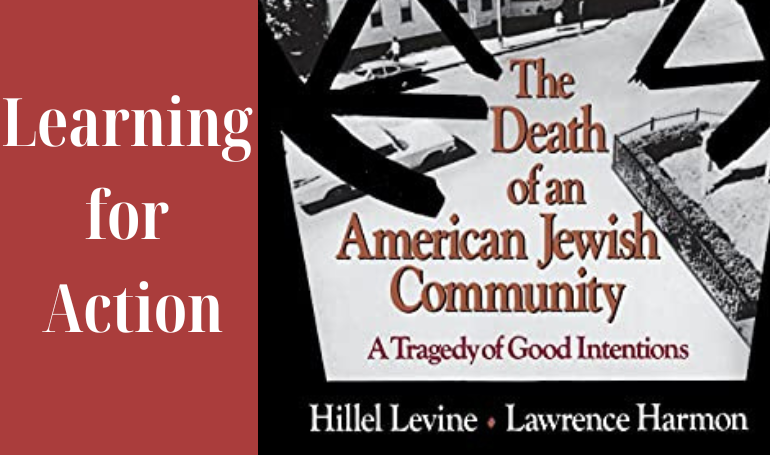
Learning for Action Series
Since 2018, AFREJ has engaged in learning about reparations and participated in reparative actions. We have co-sponsored workshops for the Boston Ujima Fund, a solidarity economy project that finances businesses in Dorchester, Roxbury, Mattapan, and Jamaica Plain that meet standards and ownership requirements approved by community stakeholders. Through this work, we have widened our concept of reparations in two ways: first, we recognize that the Jewish exodus from and subsequent disinvestment in these neighborhoods particularly calls on us as Jews to localize our reparations work there. Second, our support for Ujima and other solidarity economy enterprises signals our commitment to “full” reparations, that is, repair that transforms systems and guarantees non-repeat.
To continue this direction of learning, we created a Learning for Action series in which, over the course of 4 sessions from November 2022 to February 2023, we read Hillel Levine and Lawrence Harmon’s The Death of an American Jewish Community. This book chronicles the many players—federal and local government officials, corporate leaders and bank executives, realtors, synagogues, neighborhood organizations—that mostly fostered, but sometimes resisted—segregation and the fairly rapid de-population of the 90,000 Jews who lived in Dorchester, Roxbury, and Mattapan since the early 20th century. To better our understanding of what non-repetition could look like, we felt that we ought to delve deeper into the history, not just of the Jewish community of Boston as a whole, but of our own community . We learned, for example, that Boston Workers Circle, which moved from Dorchester to Brookline in 1962, was one of many Jewish institutions and populations that moved out of Dorchester, Roxbury, and Mattapan into the suburbs between 1950 and 1970. Sometimes these moves were orchestrated by the larger, established Jewish institutions or synagogue board members without any input from their congregations.
Class was a key factor in relations within the broader Jewish community as well as between the Boston establishment and both Jewish and Black populations. A Boston bank consortium allegedly set up to help ease tensions and the dilapidation of housing in these neighborhoods in fact offered mortgages only to Black applicants and only for properties in a redlined district populated by Jews. The ensuing conflict between Black residents and the few Jewish residents left was largely ignored by the white establishment as well as by suburban Jews who, ironically, were at the same time centrally funding Black civil rights organizations. The book’s subtitle, “A Tragedy of Good Intentions,” often seemed heavily ironic, as those intentions were continually thwarted by culpable naiveté and the pressures and prejudices of upward class mobility, entangled with and exploited by unscrupulous bankers and realtors who profited from replacing Jewish families with paid-up mortgages with Black families with unaffordable but fully federally backed mortgages on uninspected deteriorating properties.
Along with lively discussions, we also hosted speakers during two of the four sessions of the series: Leah Rothstein, author of a forthcoming book with her father, Richard Rothstein (The Color of Law), who offered strategies for confronting and dismantling segregation. At our final meeting, Marlon Solomon, head of the Afrimerican Academy, spoke about how Jewish histories have left their mark on present-day African diasporic communities in these neighborhoods. We hope to work with Marlon and his students to create and support walking tours focused on the histories of Dorchester, Roxbury, and Mattapan that tell the full and layered stories of these neighborhoods.
On March 26th, we will continue to explore this history by screening the 1995 documentary, Holding Ground, which centers on Roxbury and the efforts of the Dudley Street Neighborhood Initiative to revitalize Dudley Square in the ‘80s. We will be joined by BWC member and founder of AFREJ, Eliza Parad, Director of Municipal Democracy at the Center for Economic Democracy, the fiscal sponsor of Ujima and other solidarity economy projects. Our “good intention” is that, with this history in mind, we will find ways as a community to build more direct relationships with these neighborhoods and work in solidarity with their community stakeholders who are already fighting for equity, repair, and more justice-centered ways of blending community and economy.
